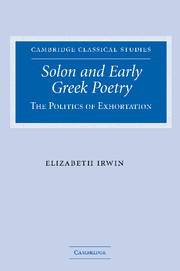Book contents
- Frontmatter
- Contents
- Acknowledgements
- List of abbreviations and editions
- Introduction
- PART I THE POLITICS OF EXHORTATION
- PART II POLITICAL POETICS: SOLON'S EUNOMIA
- PART III POETRY AND POLITICAL CULTURE
- Introduction
- 7 Solon and the language of tyranny
- 8 Rewriting (some) history: Solon and Peisistratus
- Conclusion
- Appendix I Who were Tyrtaeus' gymnetes?
- Appendix II λυκάβαντος: when the wolf comes?
- Bibliography
- General index
- Index locorum
8 - Rewriting (some) history: Solon and Peisistratus
Published online by Cambridge University Press: 05 November 2009
- Frontmatter
- Contents
- Acknowledgements
- List of abbreviations and editions
- Introduction
- PART I THE POLITICS OF EXHORTATION
- PART II POLITICAL POETICS: SOLON'S EUNOMIA
- PART III POETRY AND POLITICAL CULTURE
- Introduction
- 7 Solon and the language of tyranny
- 8 Rewriting (some) history: Solon and Peisistratus
- Conclusion
- Appendix I Who were Tyrtaeus' gymnetes?
- Appendix II λυκάβαντος: when the wolf comes?
- Bibliography
- General index
- Index locorum
Summary
However persuasive the literary and linguistic analysis of the last chapter may have succeeded in being, a ‘tyrannical’ Solon may still seem shocking from the point of view of the ancient traditions recording his career and the anti-tyrannical stance adopted in his poetry. Shifting the focus from Solon's poetry, this chapter will survey aspects of these traditions in order to examine what room exists in the traditions about Solon to read his career otherwise. The range of subjects to be covered, each with their notorious difficulties, is too great for full discussion; this chapter will function as a preliminary survey of the directions in which investigation of Solon's career and its continuities with archaic political culture – particularly as it intersects with tyranny and poetry – may move forward.
Interpretations of Solon's poetry are invariably informed by the dominant ancient accounts of his life. Since the extant fragments of Solon's poetry are largely preserved in such accounts, it requires a determined act of will to read against the tradition. And yet the problems inherent in uncritically accepting these narratives are by now obvious. The mutual dependency between the biographical tradition of Solon and the poetry used by these sources to relate the tradition serves to perpetuate a dangerously circular argument: most details about Solon's life derive from his poetry, and our extant selection of the poetry of Solon depends largely upon these accounts.
- Type
- Chapter
- Information
- Solon and Early Greek PoetryThe Politics of Exhortation, pp. 263 - 280Publisher: Cambridge University PressPrint publication year: 2005

